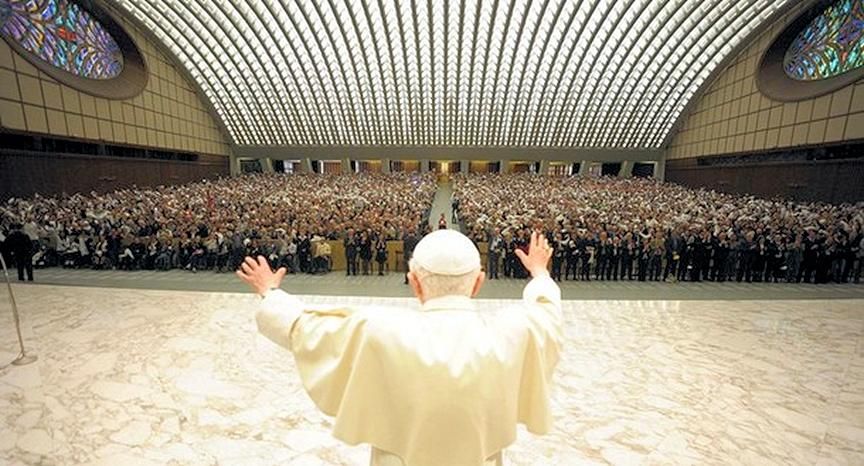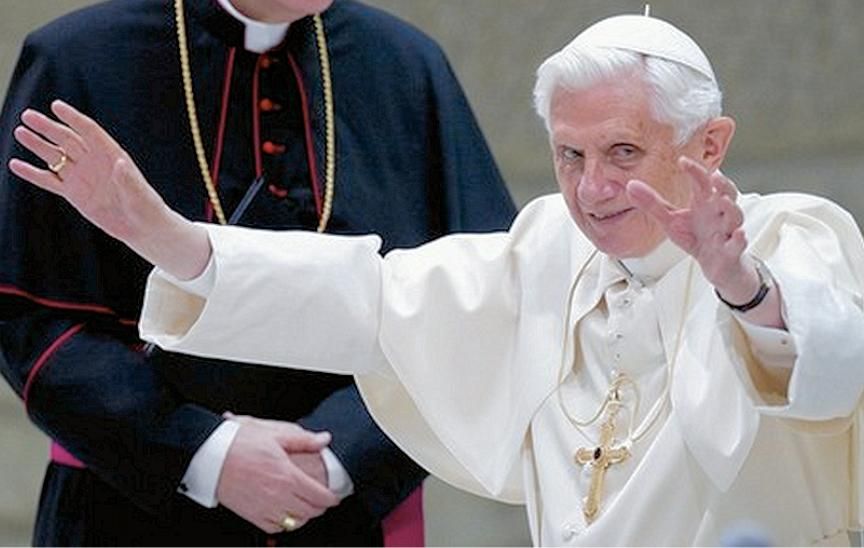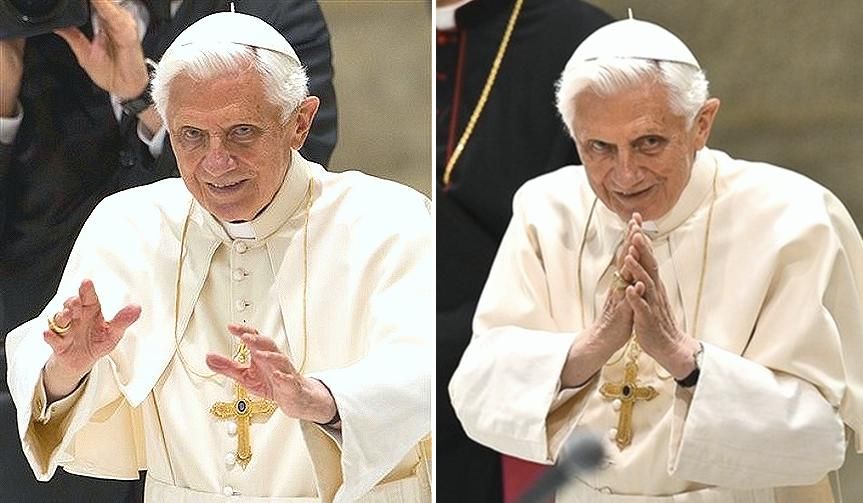| | | OFFLINE | | Post: 24.890
Post: 7.410 | Registrato il: 28/08/2005
Registrato il: 20/01/2009 | Administratore | Utente Master | |
|
 The Pope to Italian lay associations:
The Pope to Italian lay associations:
'True giving is at the heart of being Christian'

May 19, 2012




The Ecclesial Movement of Cultural Engagement, the Federation of Christian Organizations for International Voluntary Service and the Movement of Christian Workers are a group of Italian-based lay associations founded between 1932 and 1972.
Their mission is to spread the Gospel through volunteer work aiding the needy in Italy and in other countries throughout the world, as well as defending human rights, promoting social justice and education.
Speaking to the three associations gathered at the Aula Paolo VI on the occasion of their respective anniversaries, Pope Benedict underlined that fact that their establishment can be attributed to the inspiration of Pope Paul the VI who as a priest and then as Pope had been a vocal supporter of ecclesial associations such as these.
The Holy Father stressed the importance of the laity to the Church in both the private and public sphere of society, adding that their selfless contribution was vital in the promotion of cultural action, human dignity and aiding those in need.
The Pope also told those present that volunteer work in whatever field was an irreplaceable resource and the true meaning of being Christian.
True giving, said Pope Benedict, is not something laid down by law nor an economic transaction, but he said that both the political and economic sectors need people capable of mutual giving.
The Pope urged the associations to look to young people, who, he said, are seeking more than ever for ways of engagement in society that combine idealism and practicality.

Here is a translation of the Holy Father's address:
Dear brothers and sisters:
I am happy to welcome you today at this gathering together of the Movimento Ecclesiale di Impegno Culturale (MEIC), the Federazione Organismi Cristiani di Servizio Internazionale Volontario (FOCSIV), and the Movimento Cristiano Lavoratori (MCL).
I greet with affection my brothers in the Episcopate who support and guide you, your leaders and officials, your ecclesiastical assistants, and all your members and sympathizers.
This year, your associations are celebrating the anniversaries of your founding: 80 years for MEIC, 40 for FOCSIV and MCL. All three owe their existence to the wise work of the Servant of God Paul VI, who, when he was the National Assistant of Italian Catholic Action in 1932, supported the first steps of the Movimento Laureati (movement of graduates) in Catholic Action, and as Pope, recognized the FOCSIV and assisted at the birth of MCL in 1972. In memory of my venerated predecessor, we are thankful for the impulse he gave to these important church associations.
Anniversaries are propitious occasions to re-think your respective charisms with gratitude but also with a critical eye, mindful of your historic origins and the new signs of the times.
Culture, voluntariate, and work constitute an indissoluble trinomial in the daily commitment of the Catholic laity, who wish their belonging to Christ and to the Church to have an impact both in the private as well as the public spheres of society.
The lay faithful play a role whenever they act in these spheres, and when in their cultural service and their solidarity with those who are in need and have work concerns, they strive to promote human dignity.
These three spheres of action are bound by a common denominator: the gift of oneself. Cultural involvement, especially at the school and university levels, oriented towards the formation of future generations, is indeed not limited to the transmission of technical and theoretical ideas, but implies the gift of oneself with words and through example.
Volunteer work, an irreplaceable resource for society, means not so much giving things, but giving oneself while concretely aiding those who are in need. Work is not just an instrument for individual profit, but an occasion to express one's own abilities, exerting oneself, in the spirit of service, in professional activity, whether one is a laborer, a farmer, a scientist or any other occupation.
For you, all this has a special connotation - the Christian one. Your activities must be inspired by charity. This means learning to see with the eyes of Christ and giving to others much more than what they need externally - to give them the look of caring, the gesture of love that they need.
This is born from the love that comes from God, who loved us first; it is born from our intimate encounter with him (cfr Deus Caritas est, 18).
St. Paul, in his farewell talk to the elders of Ephesus, recalls a truth expressed by Jesus: "It is more blessed to give than to receive" (Acts 20,35).
Dear friends, it is the logic of giving, a logic that is often mistreated, but which you appreciate and bear witness to. To give your own time, your own abilities and competencies, your own education, your professionalism. In a word, to pay attention to others, without expecting any reward in this world. And I thank you for this great witness. Doing so, one does not just do good for others, but can discover profound happiness, according to the logic of Christ, who gave all of himself.
The family is the first place where one experiences free love. When this does not happen, then the family is denatured, it goes into crisis. When it is lived in the family, giving oneself without reservations for the good of others is a fundamental educational moment to learn to live as Christians - even in our relations with culture, with volunteer service and with the workplace.
In the encyclical Caritas in veritate, I wanted to extend the family model of the logic of gratuitousness and of giving to a universal dimension. Justice alone is not sufficient.
In order for there to be true justice, that 'something more' is necessary which only gratuity and solidarity can give: "Solidarity is first and foremost a sense of responsibility on the part of everyone with regard to everyone, and it cannot therefore be merely delegated to the State. While in the past it was possible to argue that justice had to come first and gratuitousness could follow afterwards, as a complement, today it is clear that without gratuitousness, there can be no justice in the first place" (No. 38). Gratuitousness is not acquired on the market, nor can it be prescribed by law. Yet both the economy and politics need gratuitousness, persons capable of reciprocal giving (cfr ibid. 39)
Our meeting today proves two elements: the affirmation on your part of the need to continue to follow the way of the Gospel, faithful to the social doctrine of the Church and loyal to your Pastors; and on the other hand, my encouragement, the Pope's encouragement, who invites you to persevere constantly in your commitmento n behalf of your brothers.
This commitment also includes the task of pointing to injustice, and to bear witness to the values on which the dignity of persons is based, promoting forms of solidarity which promote the common good.

The MEIC cultural movement, in the light of its history, is called to renewed service in the world of culture, which presents urgent and complex challenges, for the dissemination of Christian humanism. Reason and faith are allied in the journey towards the Truth.

May the FOCSIV volunteers federation continue to trust above all in the power of charity that comes from God, carrying forward your commitment against every form of poverty and exclusion, and working in behalf of the more disadvantaged populations.

And may the MCL movemen bring light and Christian hope to the workplace in order to gain even more social justice. Moreover, may you look always at the world of the young who, today more than ever, are seeking ways of involvement that bring together idealism and concreteness.
Dear friends, I wish each of you to proceed with joy in your personal and associative commitments, bearing witness to the Gospel of giving and gratuitousness.
I invoke the maternal intercession of the Virgin Mary upon you, and I impart to you the Apostolic Blessing, which I extend to all your members and to your families. Thank you for your commitment, thank you for your presence.


[Modificato da TERESA BENEDETTA 20/05/2012 13:04] |